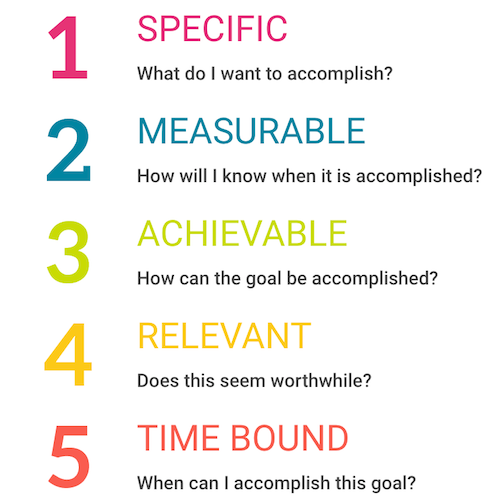If you have been to any personal or career development courses, you may already be familiar with the term SMART goals. If not, not to worry, I am here to tell you all about it.
In one of my previous articles, I mentioned about why New Year’s Resolutions sometimes fail. Most times after the initial few days or months, they seem very demanding and unachievable. This is why we need some SMART goals. I first learned about SMART goals in a professional context of being an Software Professional. But I soon realised that the principles can be applied to other areas in my life.
SMART is an acronym for some of the criteria you need to consider when setting yourself a goal.
S for Specific
When you set a goal, make sure it is very specific. For example, if I set a goal “Write”, that is not very specific. May be I can clarify it to say “Write a 80,000 word Thriller Novel”. This SMART goal now conveys the type of writing I am planning to do (novel), the genre (thriller) and even the word-count (80,000).
M for Measurable
Goals need to have milestones that it can be broken down in to. This acts as an encouragement and will also help you review what is working and what is not. In the example I used above – “Write a 80,000 word Thriller Novel”, using the word-count helps me break the goal into smaller milestones of 10000 words, 20000 words and so on. So when you are setting yourself a SMART goals and there are no numbers involved, think again!
A for Achievable
Goals you set for yourself should be achievable. This has been one of my weak points. There are times when I set some goals that seems achievable (in my head, of course!). But over time, I cannot even make a start because they are too daunting.
In my personal opinion, there are no unachievable goals. When you set your focus on a goal, you will develop the skills and financial capacity to reach them. You will find your own opportunities and you will make time that you never knew existed. But if you have not made any progress at all in the last one month on a particular goal and you feel it is over demanding, then my simple recommendation is to Start Small.
For example, if this was my first novel-writing experiment, then “Write a 80,000 word Thriller Novel” may be overreaching. I would instead go for something simpler as “Write an Outline for each the 15 key Chapters of my next Novel”. Now I don’t have to worry about 80,000 words. First round the focus is on the outline. This goal is still specific and measurable. And with this change, it is achievable too. After the outline is ready, I can then focus on the next goal which may be to write the first 5 chapters with a set word-count. A major lifestyle change or outcome will always be made of such smaller SMART goals.
R for Relevant
This is an important and yet often ignored one. If you are setting a goal, do it because you want to achieve it… not because it is in the 10 most popular goals or because your partner is doing it. So set goals that you personally are drawn to, not something the outside world (people, situations, organisations) pushes you to.
Also, look at setting SMART goals that are life altering and sustainable. If you are deep in debt, becoming a millionaire may not be an ideal goal to start off with. Clearing the debts and living within your means could be a good start. Because unless you get out of a debt-creating lifestyle, you could become a millionaire and then become a person with couple of millions in debt. What good is that in the long run?
I am of the opinion that you should not be focussing on more than 2 or 3 SMART goals at a time. Because no matter how relevant they may seem when you start off with them, they will soon compete with each other for your time and focus. Slowly some of them will start feeling irrelevant to you. These are the goals you actually want to achieve, but with the other things happening in your life, it may not be relevant to you now in that particular moment.
T for Time-bound
When you set a goal have a sensible time frame to go with it. This is another one of those aspects everyone knows about and still get it wrong. If there is no time frame, then there will never be a sense of urgency. But if there is a stringent time frame, then you may easily lose motivation. I have in the past over optimistically set my timelines for the goals only to realise that there are going to be “down days” – with illness or working overtime or even sometimes plain old laziness. If you have done the same, don’t worry. This seems to be a common problem.
For example, if my goal is to “Write a 80,000 word Thriller Novel”, I can time frame it by planning 2000 words a week which takes me to 40 weeks. That gives me sense of urgency that I need to write a minimum of 2000 words per week. However, I would be insensible, if I set the time frame as 40 weeks. I would instead throw in 8 weeks of vacation and go for 48 weeks. That is 20% contingency – but hey why not, my life, my novel! Remember: It is not an exam, it is a goal.
So what are you waiting for? Elbert Hubbard, an American writer rightly said:
Many people fail in life, not for lack of ability or brains or even courage, but simply because they have never organised their energies around a goal.
If you have set yourself some goals already, go ahead and check if they are indeed SMART. And if you don’t have a goal, why don’t set a SMART goal today. Just remember to ask your self some smart questions before you set your goals, though.

Happy Goal Getting!
Let me know in the comments below if you found this article useful. What SMART goal have you set for yourself?
If your are interested in reading my other “Goal Getter” articles head over here.
 Sony Simon Live. Love. Learn.
Sony Simon Live. Love. Learn.

Your articles are really motivational! 🙂
Hey, great article ! Well written and excellently presented. Just seeing that you haven’t been so active in a few years now and wanted to shout out to say ‘hi’ and keep up the great work !